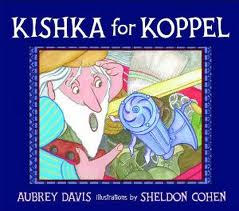Believe it or not, I like bad reviews. The good ones, anyway. I appreciate criticism of my writing that helps me become better at what I do. The review of Mezuzah on the Door that I quote most often is that the dialogue is, at times, “stiffly didactic.” It’s true, and one of the things that bothered me most about that book, though I hadn’t been able to name it until I read that review.
I took those words to heart when working on the Shabbat Princess. I pass it on to other writers, too, when they show me their manuscripts and ask for advice. I remind them, and myself, that putting information into quotation marks doesn’t really make it dialogue, or at least not dialogue that resonates as authentic.
I’m grateful that the response to The Shabbat Princess has been overwhelmingly positive. But, I’m no Kevin Henkes. My work is flawed and would absolutely benefit from some good bad reviews. So when I stumbled across a negative review in the Association of Jewish Libraries November/December newsletter (I had to stumble across it because apparently my publicist only sends me the nice ones) I was actually a little excited. What advice could I apply to the manuscript I’m currently struggling with?
Unfortunately, I’m not quite sure.
As Rosie watches her mother prepare for Shabbat, she asks why her mother takes such care in setting the table. Her mother replies that she is welcoming the Sabbath Queen. Since Rosie prefers princesses over queens, she decides to dress as the Sabbath Princess which makes the story feel a little far-fetched. As Rosie begs for a moat and Fairy Godmother, the text strays away from Shabbat. It gets back on track when Rosie encourages her parents to turn the Shabbat table into a royal banquet by using their best candlesticks and polishing the Kiddush cup. This story does a poor job of explaining the significance of Shabbat and why we welcome the Sabbath queen. it.
I get the far-fetched part, though I don’t think it would have been far-fetched for my own girls, who inspired the story. I was less sure what to make of the “back on track” part (whose track?) and the “poor job of explaining” part. Do all books that are about Shabbat have to explain about Shabbat? Should I be more didactic, stiffly or otherwise?
 Interestingly, the newsletter also had a review (by a different reviewer) that panned one of my favorite books of the year, Kishka for Koppel, by Aubrey Davis. She actually chose my favorite line (the one that had me almost spit out my coffeee at a book fair in Newton) as “the death blow to this story. ”
Interestingly, the newsletter also had a review (by a different reviewer) that panned one of my favorite books of the year, Kishka for Koppel, by Aubrey Davis. She actually chose my favorite line (the one that had me almost spit out my coffeee at a book fair in Newton) as “the death blow to this story. ”
“YOU HAD ANY WISH IN THE WORLD AND YOU WISHED FOR STUFFED SHEEP GUTS?”
Which leads me to conclude that librarians have a different set of criteria for books than other readers. A valid set, but not the same as those of literary critics, parents, and perhaps, kids. What that means for my odds of any kind of nod from the soon-to-be-announced Sydney Taylor Book Awards, which is an arm of the Associaion of Jewish Libraries, I don’t know…..but if they pass me over, at least I have my own Sydney Taylor award, the stack of letters she wrote me as a child, to console myself.
In the meantime, I have a request. I’m doing some research for reasons I’ll explain soon. Here’s what I want to know: Do you read children’s book reviews? What do you look for in a book review? Do you have any favorite reviewers, or sources for reviews, and if so, why?
Shavua Tov, and thanks for your help, as always.
